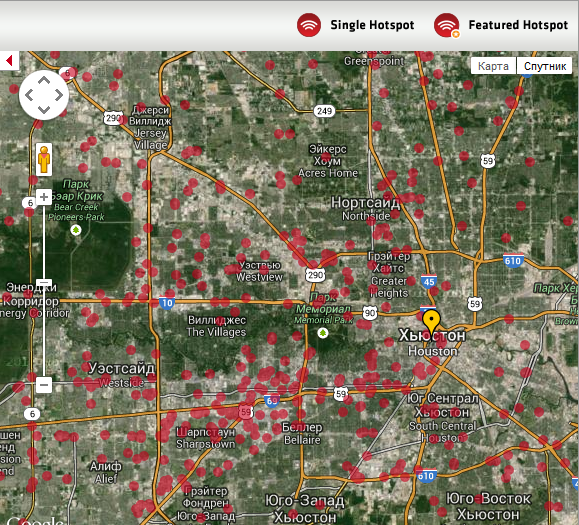Advertising Wars: Search Engines Against Internet Providers

Today it seems that the hegemony of search companies like Google and Yandex in the world of online advertising is almost impossible to shake. However, if you dig a little deeper, it turns out that mobile operators , which have even deeper knowledge about users, can compete with search engines for their data . But this is not all - Internet providers can (and sometimes already are) become another potentially very dangerous rival in the online advertising market.
What are we talking about
Few people think that Internet providers can be extremely successful players in the advertising market - they have significant reach of an audience that even more search engines know about. Theoretically, all this may well allow them to become the largest sellers of advertising on the Internet.
At the same time, despite the current peaceful coexistence of Internet service providers and search giants such as Google, the situation may well become much more tense in the future.
Google vs free
These are not empty words - the first such conflict has already occurred between Google and the French Internet provider Free.fr (there was a topic about it on Habré ). The provider included for all its subscribers (which is 5.3 million users in France) a forced filter of online advertising, so they stopped seeing banners on websites, AdSense contextual advertising and other ads.
Despite the fact that not only Google, but also other advertising systems, online media and Internet projects suffered from this step, observers call the largest search engine the target of the attack.
An interesting point here is that the decision of the provider was even supported by the authorities of the country - it was even approved by the Minister of Digital Economy of France (despite this, a few weeks later the filter wasdisabled ). This fact alone speaks in favor of the fact that providers in other countries can make the decision to turn off advertising by search engines and other advertising companies in their networks. This is good for users - because in the pursuit of advertising revenue, providers will be forced to attract an audience with various offers, including, possibly, free Internet.
Internet hosts
Recently, the Internet exploded with news that the US Internet provider Comcast plans to cover the whole country with its own WiFi, which will be "distributed" by devices already installed in the homes of Americans. In addition to the private network, a public network will be created on the router, which anyone can connect to (if he is a Comcast subscriber).
A pilot project was launched in Houston - the new mode of operation of access points was activated remotely, users did not even notice anything. As a result, the entire city was covered by Comcast's WiFi network.

The Comcast project is not the first of its kind. In Spain, since 2005 there is a WiFi-network community operated by FON. Members of this network also provide wireless Internet to other users who find themselves in the reception area. For this, a special WiFi access point is used. The system work scheme is similar to that presented by Comcast - a private network is created for the device owner, and a public network for external users.
A noteworthy fact: FON investors are Google, Skype, Index Ventures, Sequoia Capital and British Telecom, who invested $ 22 million in it.
The experience described suggests that, if desired, Internet service providers can create the largest networks covering a huge audience. And given their ability to disconnect unwanted services from their networks, the situation is starting to emerge with the emergence of new hegemons of the online advertising market, which will be much more invulnerable than current leaders (Google cannot help working with large providers, so they can easily turn off its advertising )
What to do to search engines
Apparently, search companies understand that in the near future they may face serious competition. However, Internet providers can spend the resources available to them to expand their subscriber coverage - a simple purchase of smaller companies will significantly increase the base, while the search giants will not be able to do this - they cannot just buy users because a truly large Internet search engine It is very expensive.

This is largely why Google itself is putting great efforts into providing the Internet to people in places where it is not yet (for example, using Project Loon balloons ) or creating network segments that will be completely controlled by the company.
Google is well aware of its dependence on third-party companies that own communication channels, and seek to reduce these risks.
By the way, they understand this in another advertising giant - the Facebook social network, which plans to “distribute” the Internet in hard-to-reach places with the help of unmanned drones and enable its use to a wide number of people who cannot do this now.
Such Google and Facebook projects cost millions (if not billions) of dollars that companies would not spend if there was no understanding of the need for this action. Analysts note that one of the main reasons for such concern for people deprived of the Internet is the desire to show them their ads, depriving this opportunity of competitors. The Internet from drones or balloons in the stratosphere is the business of the future, IT giants hope that by this time the incomes of the population of these poor regions, which are planned to be covered using the new Internet, will grow enough so that they can consume at least not very expensive goods. Given the billionth population of such remote territories, a particular person living there will not need to buy expensive goods - the main thing is to have the opportunity to consume
Who will win
Internet providers are often also mobile operators - in Russia, a vivid example of this is Beeline, MTS with the same Internet providers and Megaphone with its Netbynet, which allows them to get a scale of user data that is incomparable with anything - even Google and Yandex with their services, they can’t find out so much information (often personalized) about a person. Cookies cannot be compared by accuracy of identification with official papers signed to receive Internet or mobile services.
By the availability of resources (including financial and administrative), providers are also not inferior to search engines. Capitalization of Yandex back in 2013 was at the level of $ 10 billion (after President Putin’s statements about a foreign hand in the company, capitalization fellto less than $ 8 billion), but at the same time, MTS capitalization in 2012 amounted to $ 18.69 billion, and Beeline indicators in the same year amounted to $ 18.16 billion (data on capitalization at the end of 2012 can be found in the RIA Novosti rating )
Advertising costs in the world are growing so rapidly that many players will want to get their own piece of this multi-billion dollar pie. Competition promises to be fierce and very interesting. But for users, the most important thing is that it pushes companies to innovate and create new services that did not exist before.
Only registered users can participate in the survey. Please come in.
For whom do you support the fight and who do you think will win?
- 10.5% Internet Service Providers 57
- 27.1% Search Engines 146
- 1.6% Mark Ts and his Facebook 9
- 60.5% This is an all matrix, Neo 326
